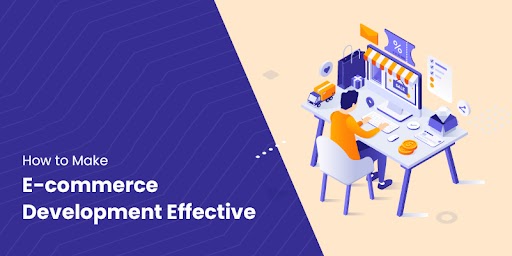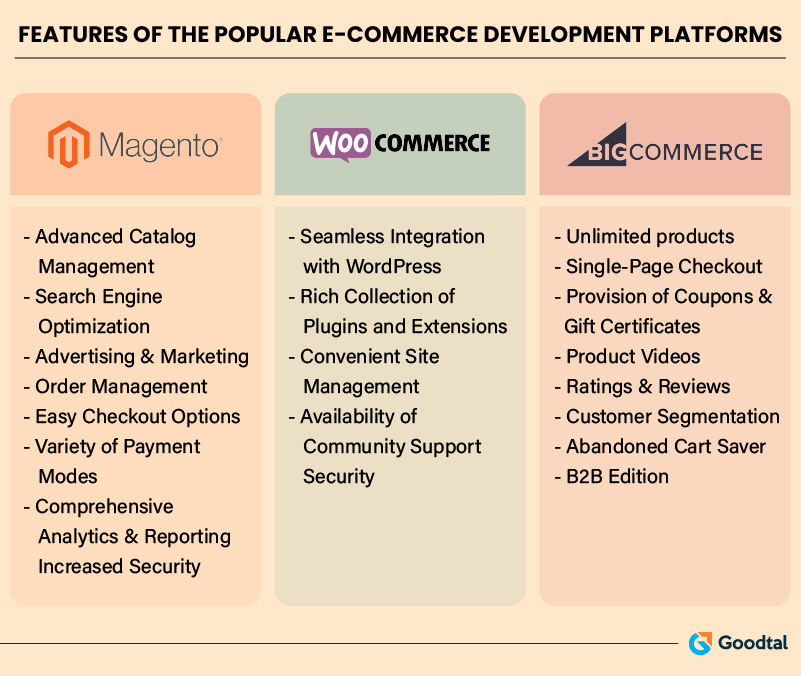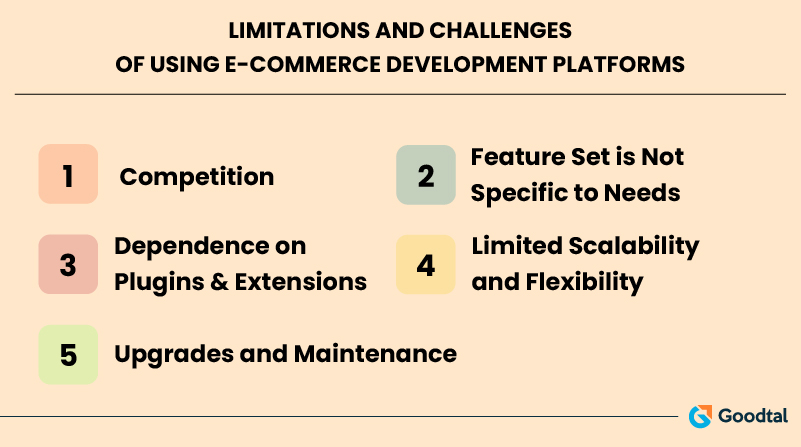
The e-commerce development concept has existed for more than a decade. Initially, the e-commerce developers were building customized e-commerce web-based applications from scratch. As the requirements increased manifold, the competition prompted them to try different tools and technologies to make development quick and effective.
The tools and technologies available for e-commerce development have also seen huge transformations over the years. Compared to those in the primitive stages of e-commerce development, e-commerce developers now have access to various platforms that make their work quick and easy and eliminate the need to reinvent the wheel!
Some of the most popular e-commerce development platforms are Magento, WooCommerce, and Bigcommerce. These have existed for years and have developed and improved with the changing market needs.
What are the latest e-commerce trends, catering to the emerging requirements in e-commerce development?
E-commerce Development Trends
Development trends keep changing rapidly. So, we will discuss those which are expected to continue in the near future.
Progressive Web Apps
PWAs that can run on multiple platforms and devices are the need of the times. The PWA concept is not new! However, more and more development is taking place in this domain to make these apps perform better increasingly.
AR/VR Integration
The use of augmented reality and virtual reality in e-commerce is trending like never before. E-commerce players are considering virtual product trials to motivate users to buy fearlessly. AR/VR integration is now common in e-commerce apps as users are embracing the trend. You can always ask your e-commerce development partner to incorporate AR/VR in the application. The well-known platforms have ready access to extensions; you can expect your Opencart developers to integrate the extension easily.
Omnichannel Selling
E-commerce users are not confined to websites anymore! They are on multiple channels such as websites, social networking platforms, messaging platforms, etc. To reach out to them, the top e-commerce players are exploring omnichannel selling. The attempts have been very successful so far, in selling as well as in bringing higher traffic to your e-commerce site, and in increasing customer engagement and retention. If you are going with an e-commerce platform like Shopify, engage the best Shopify developers who can deliver exceptional omnichannel selling experiences.
Gamification in E-commerce
Everyone likes games! Who doesn't agree with that? So, you can attract and retain more users by integrating gamification into e-commerce. It's not very difficult, just consult some experienced game development companies and they will give you enough ideas to go ahead.
Headless Commerce
Separating the frontend from the backend of your e-commerce application is known as headless commerce. It has various benefits such as omnichannel selling, high levels of personalization, speed to market, agility, performance, and scalability.
Visual Search
Searches in e-commerce have come a long way from text search to voice, and now to visual search. The search algorithm is becoming more powerful and leading to accurate results in very little time. E-commerce players are largely leveraging visual search as a distinguishing feature, to beat the competition. Popular e-commerce platforms offer visual search options. Ask your Prestashop developers to try the add-ons!
Multi-Store Management
E-commerce is focussing on customization based on different market needs. Localization is one such attempt that gathers too much attention as it increases engagement and helps reach out to customers from varied locations, including the remote which are challenged by language barriers.
Customers from different countries have different cultural preferences and needs, also owing to the difference in languages, currencies, and trends. So, e-commerce is now moving towards multi-store management of the site, with each store catering to a specific customer segment.
As we just saw the trends in e-commerce development, let’s also discuss the features in the commonly used platforms that are supporting these trends and making it lucrative for developers to use these platforms.
Suggested Reading: A Complete Guide to E-commerce App Development
Features of the Popular E-commerce Development Platforms
Let’s discuss the various features of the most popular e-commerce development platforms that the developers are currently leveraging.

Benefits of Using the Top E-commerce Platforms
Have you wondered why many top e-commerce development companies are considering e-commerce development platforms for their sites?
The answer lies in the benefits that they are deriving!
Reduced Costs
With a lot of ready-to-use code, e-commerce developers need not start from scratch when they are using the best e-commerce platforms for developing the site. This saves time and resources considerably, especially if your needs are basic and you do not want to spend a lot of time and money on development from scratch.
Quick Deployment and Fast Time to Market
E-commerce platforms, as already mentioned above, expedite site development. Thus, if you have heavy time constraints, you can develop a quick solution with a faster time to market.
Availability of Ready Plugins and Extensions
Loads of plugins and extensions available with the ready-to-use e-commerce development platforms make it easier for the developers to add more features as and when required. As such you get so many ready features in these platforms that you would not even have planned or perceived while planning your initial, basic project. These platforms thus also act as a benchmark when you are planning what you must include in your site.
Ease of Use
The biggest reason for the popularity of e-commerce development platforms is the response from the users. These platforms have been developed and improved over the years after continuous feedback from the end users who are managing the site. Moreover, the administration panels of these platforms are designed such that even the non-technical end users handling the admin of the portal can do it with ease, and without the intervention of technical support.
Limitations and Challenges of E-commerce Development Platforms
Is it always possible to develop an effective e-commerce portal using the available platforms as described above?
No, there are reasons why some players opt for customized e-commerce development. Let’s look at the limitations and challenges of platform-based e-commerce development that necessitate customized development for many.
Competition
All the major players have shifted to online commerce, making the competition very tough for their peers. Unique features and functionality can attract users to your portal compared to that of the competitor. For example, Magento developers claim that Magento has a very large feature set to meet a wide range of requirements. Though this is true, we can’t say that it would suffice any innovative need coming up anytime in the future.
The market leaders are thus exploring more and more features and functionality to beat the competition and sustain their positions in the market. And, so, the update in portals has to be so rapid that the platforms can’t even keep up with the fast-changing needs and advanced feature requirements.
Feature Set is Not Specific
There can't be a ready solution for just any innovative idea developed, even at the experimentation stage when there is no assurance of whether it will work in the market. And, how would the developers of the platform predict what will trend in the coming year?
Most ready-available e-commerce platforms have a specific or limited set of features. No, I am not trying to say that e-commerce platforms offer a limited set of features. There are loads of features available with them. However, these are obviously not exhaustive for just any kind of e-commerce requirements that would match every business's needs.
If your business is looking for a feature that hasn't been tried before and is completely new to the market, you will invariably have to go for customized e-commerce development from one of the best e-commerce development companies. It is expected that if your innovative idea is successful among the users, others will also adopt it and these platforms will be configured to accommodate that as well. But, when you want to be the first to try it, you must go for customized development.
Dependence on Plugins and Extensions
There are a variety of plugins and extensions available for different features and functionality in all the top ecommerce development platforms. Some of these are third-party plugins, some are paid.
When you need to integrate a particular functionality, you need to try different plugins or extensions to select the one that matches your needs. This is a time-consuming process and requires a lot of expertise.
In the end, you might not even get the plugin that you wanted. In this case, you will have to go for a custom plugin or extension development for your chosen platform. For example, if you are using WooCommerce, only the best WooCommerce developers are expected to develop custom features and functionality compatible with your WooCommerce-based site.
Assuming that you are able to finally select a plugin that matches your platform and needs, your efforts still do not end here. After integration, these plugins need regular upgrades, also after each version upgrade of the platform that you have used. Some plugins stop performing after such mismatched version upgrades, and some upgraded versions could crash during integration, affecting the performance of the portal.
Many businesses do not want to get trapped in this vicious circle of plugins, so they go for custom e-commerce development from scratch.
Suggested Reading: Top Reasons WooCommerce Is Loved by Ecommerce Developers
Limited Scalability and Flexibility
Many businesses feel that custom e-commerce development gives them better scalability and flexibility compared to e-commerce development using the most popular platforms.
Upgrades and Maintenance
When you are going with platform-based e-commerce development, you are dependent on upgrades from the portal source. This leaves businesses concerned about their security too. Moreover, as soon as the upgraded version of the platform is released, you must upgrade your site to the new version to keep your website performing and secure. For example, your Bigcommerce developers must keep regular track of Bigcommerce platform version upgrades, and make sure that they upgrade your site accordingly and quickly.
Upgrading your site to the next version of the platform is often risky and can lead to downtime and crashes due to bugs or dependencies in plugins, or even technical glitches. Thus, many businesses find platform-based sites difficult to maintain. Custom e-commerce development gives you better control as it is your code and you can plan maintenance according to your needs.

Wrapping Up!
E-commerce platforms continue to trend in e-commerce development. We have discussed some platforms and their features here. If you have time and resources, you can try these platforms. This will help you evaluate and select the best for your requirements.
If you are determined to use any of these platforms for your e-commerce site, you must hire the best e-commerce development company specifically for this domain, else you can’t expect the best results.
